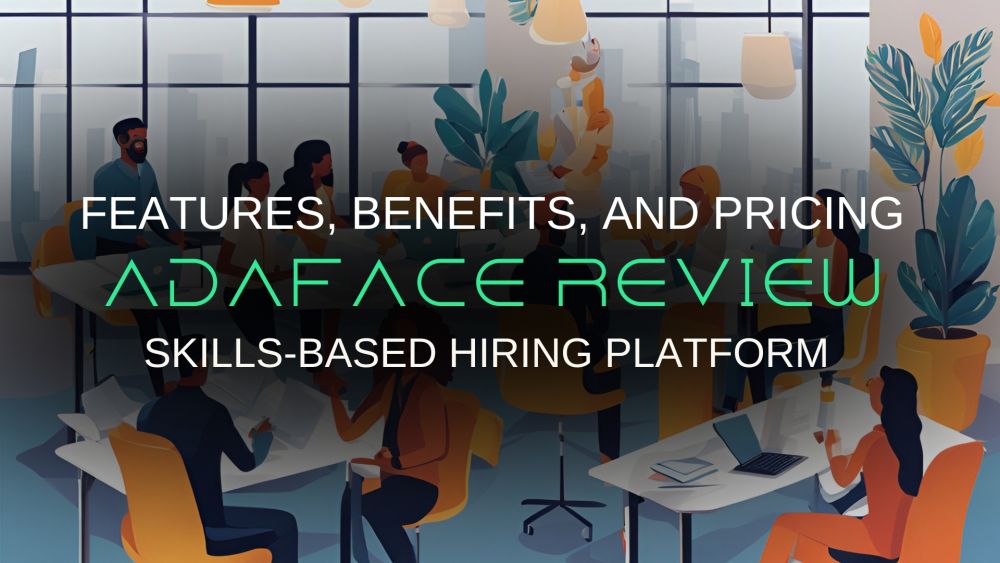Adaface Review: Skills-Based Hiring Platform - Features, Benefits, and Pricing
Imagine you’re trying to find the best pizza chef in town. Do you read endless resumes describing their pizza-making philosophy? Nope. You’d probably just, you know, taste their pizza. So why do we hire people by scrutinizing resumes and not testing real skills? If you're tired of the usual HR charade and want to find people who can actually do what they claim, meet Adaface. It's like a taste test for job candidates. Intrigued? Let's go.
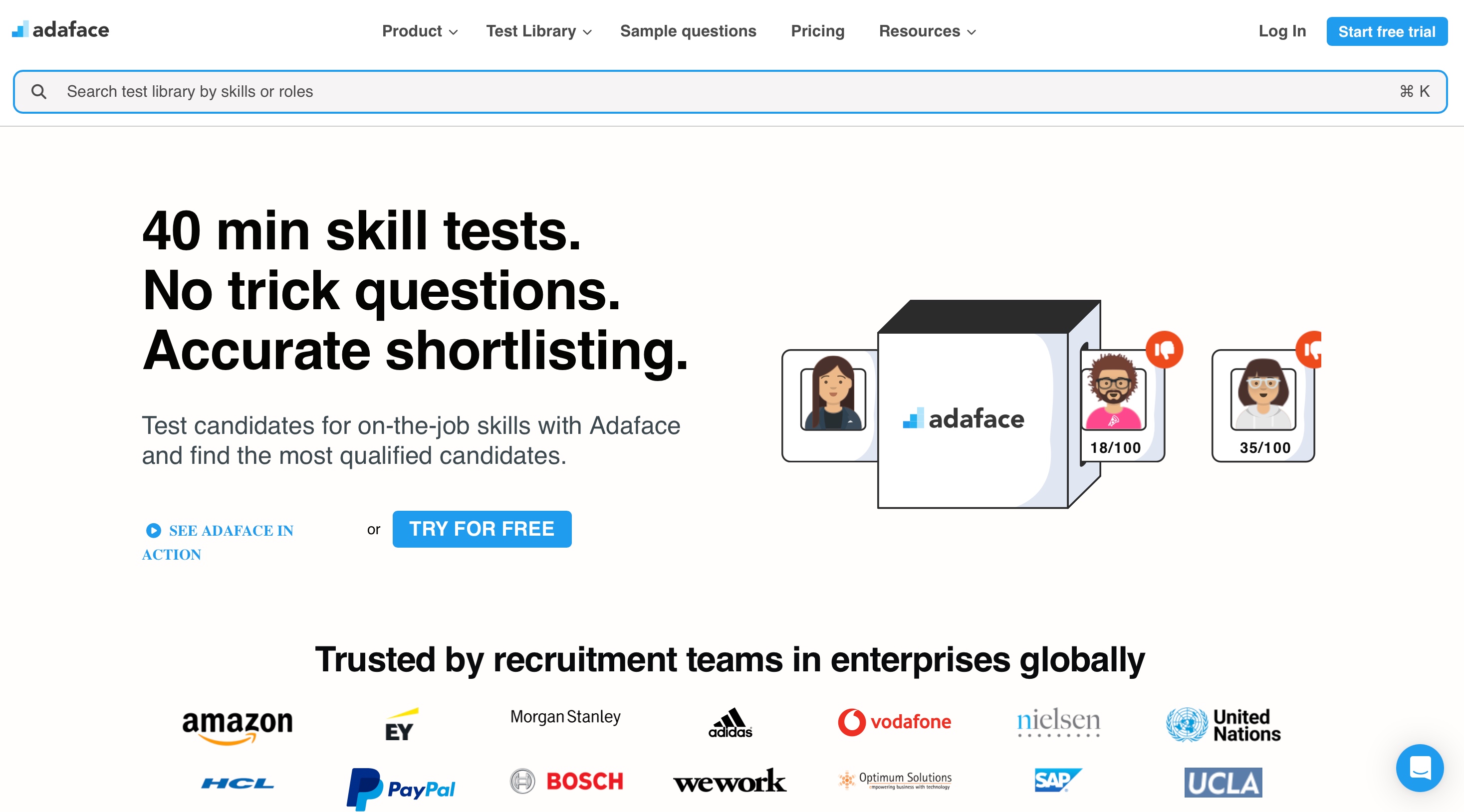
What is Adaface?
Okay, so we've established that resumes are a bit like reading a pizza chef's philosophy instead of tasting their pizza, right? So, what exactly is Adaface? Well, think of it as your online pizza-tasting booth for job candidates. Instead of just looking at their resumes or asking them abstract questions, Adaface lets you actually see if they've got the skills to do the job. It's like, "Show, don't tell," but for hiring.
Essentially, Adaface is an online assessment platform that helps companies evaluate candidates based on their actual abilities. Forget the tricky interview questions that test your knowledge of obscure algorithms or random facts; Adaface is all about assessing practical, on-the-job skills. They have ready-to-go tests across different domains and roles, and you can even customize them to fit your specific needs. It's designed to be a more reliable and efficient way of finding people who can actually, you know, do the job.
Now, let's talk analogies, because who doesn't love a good analogy? Imagine you're hiring a new driver for your team. Would you just ask them about road signs and the history of traffic laws? Probably not (unless you really like long lectures). Instead, you'd want to see them behind the wheel, navigating the road. That’s exactly what Adaface does; It's like giving them a practical driving test, not just a written theory exam. You wanna see if they can actually steer the car, not just know which pedal is the accelerator. In essence, Adaface is focused on the "can do" rather than the "know about."
Another way to think about it, and this might sound like I am oversimplifying it but bear with me, is that it is like a simulation game. You give them a work simulation, and see how they perform in it, its that simple.
So, how does it work? Basically, Adaface uses a mix of different question types (multiple-choice, code snippets, short answer, etc.), presented in a conversational way that feels way less intimidating than a traditional test. They use a chatbot, called 'Ada', to guide candidates through the assessment process. Think of Ada as a friendly test proctor, who doesn't breathe down their necks. It's all designed to be less stressful, more engaging, and a better experience for everyone involved.
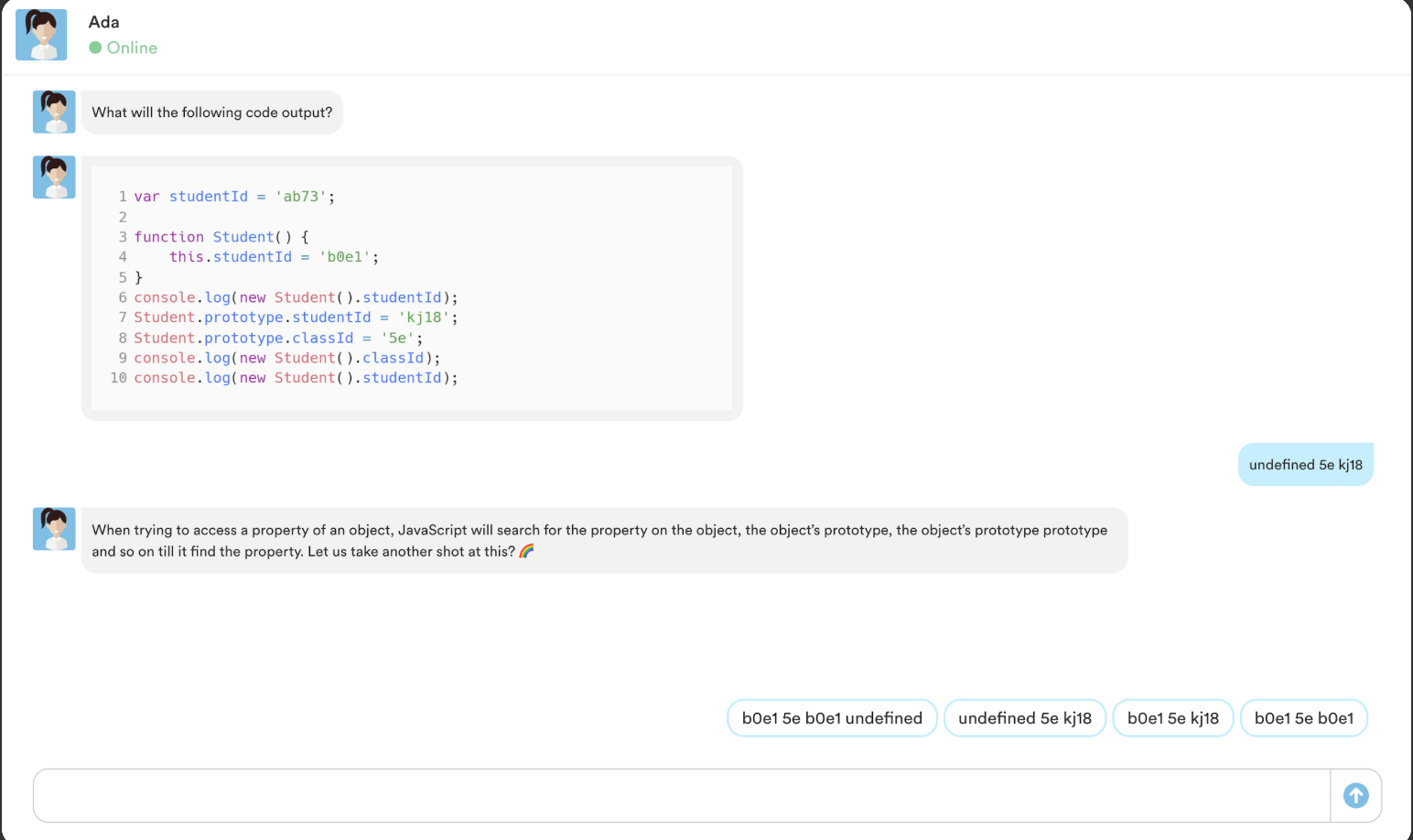
They've also got some really cool proctoring features to make sure that the tests are fair for everyone and to make sure that your candidates are not consulting Mr. Google during the process. This is to avoid sneaky moves, so that you make sure that you are actually testing their skills.
My Adaface Exploration
Alright, let's get real. I didn't just read about Adaface; I jumped in and explored the platform myself with a free trial (you know, for science!). I spent some time navigating the interface, and I have to say, my first impression is that this isn't just another hiring tool; it's a well-crafted system designed with usability in mind.
First off, the dashboard is remarkably intuitive. It's clean, uncluttered, and easy to get around – which is a huge win for someone who’s used to clunky interfaces. Right away, you’re presented with a prominent search bar, making it quick to find the test you need.
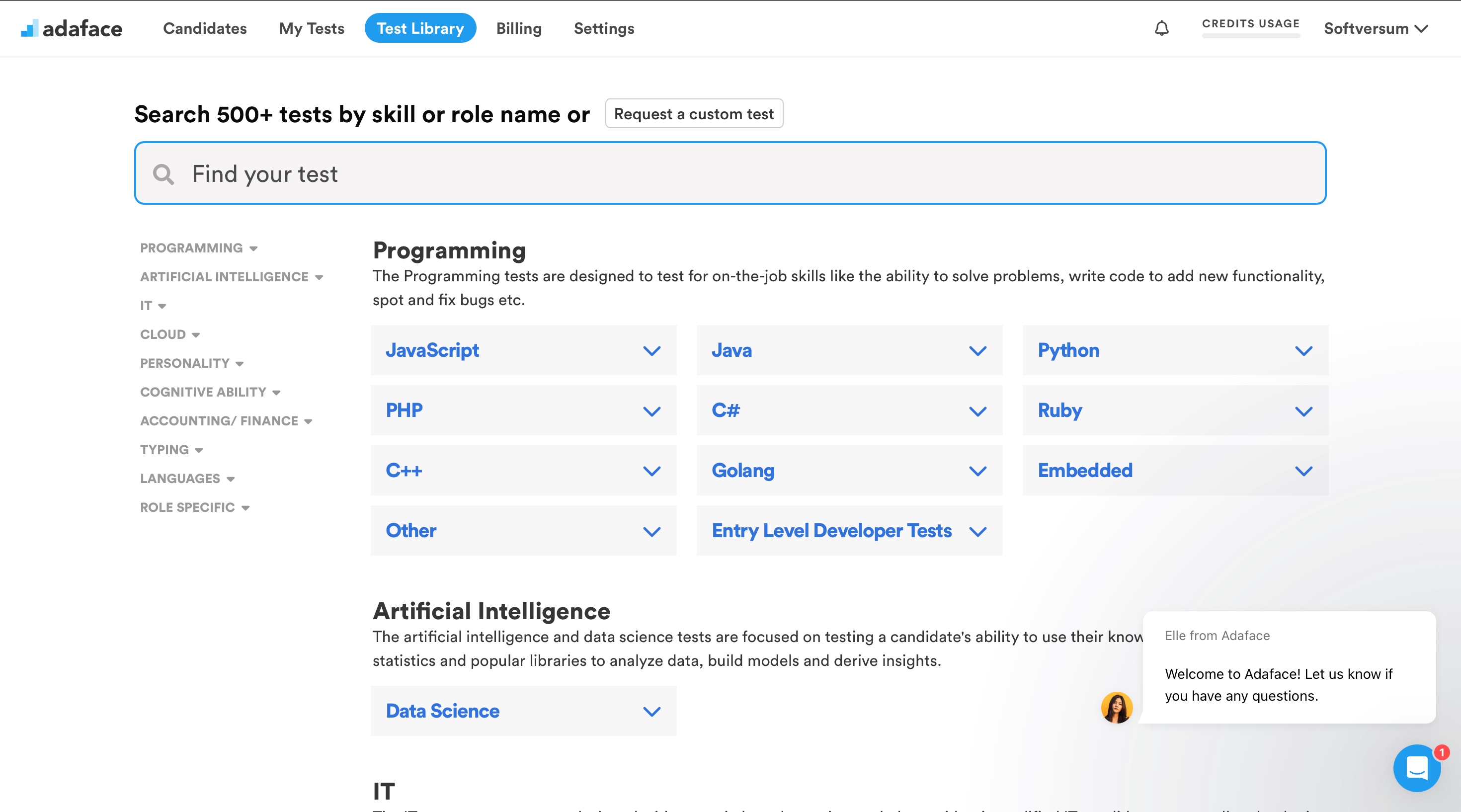
And if you prefer browsing, you can navigate through the well-organized categories. This includes:
- Programming
- Artificial Intelligence
- IT
- Cloud
- Personality...and more!
It’s like a library, but for job skills; it’s organized and easy to navigate. The sheer variety is honestly quite impressive. And, if you can’t find exactly what you need, you can request a custom test, which is pretty useful.
Next up, I explored a sample candidate’s results, and this is where things got really interesting.
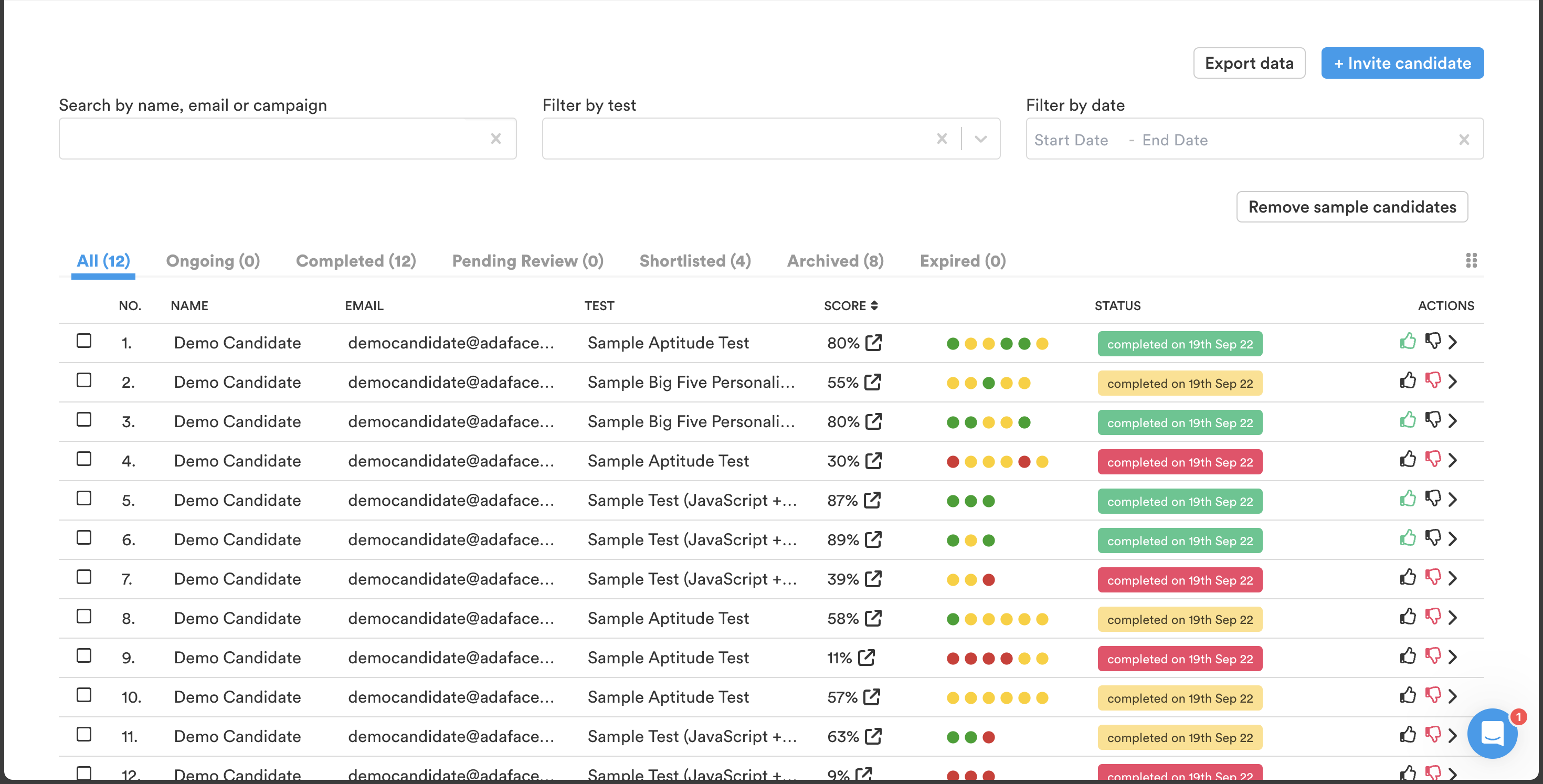
Forget vague scores; Adaface provides a super detailed breakdown of performance in different skill areas. Take an aptitude test, for example. Instead of just one number, you can see scores for:
- Logical Reasoning
- Numerical Reasoning
- Data Interpretation...and more.
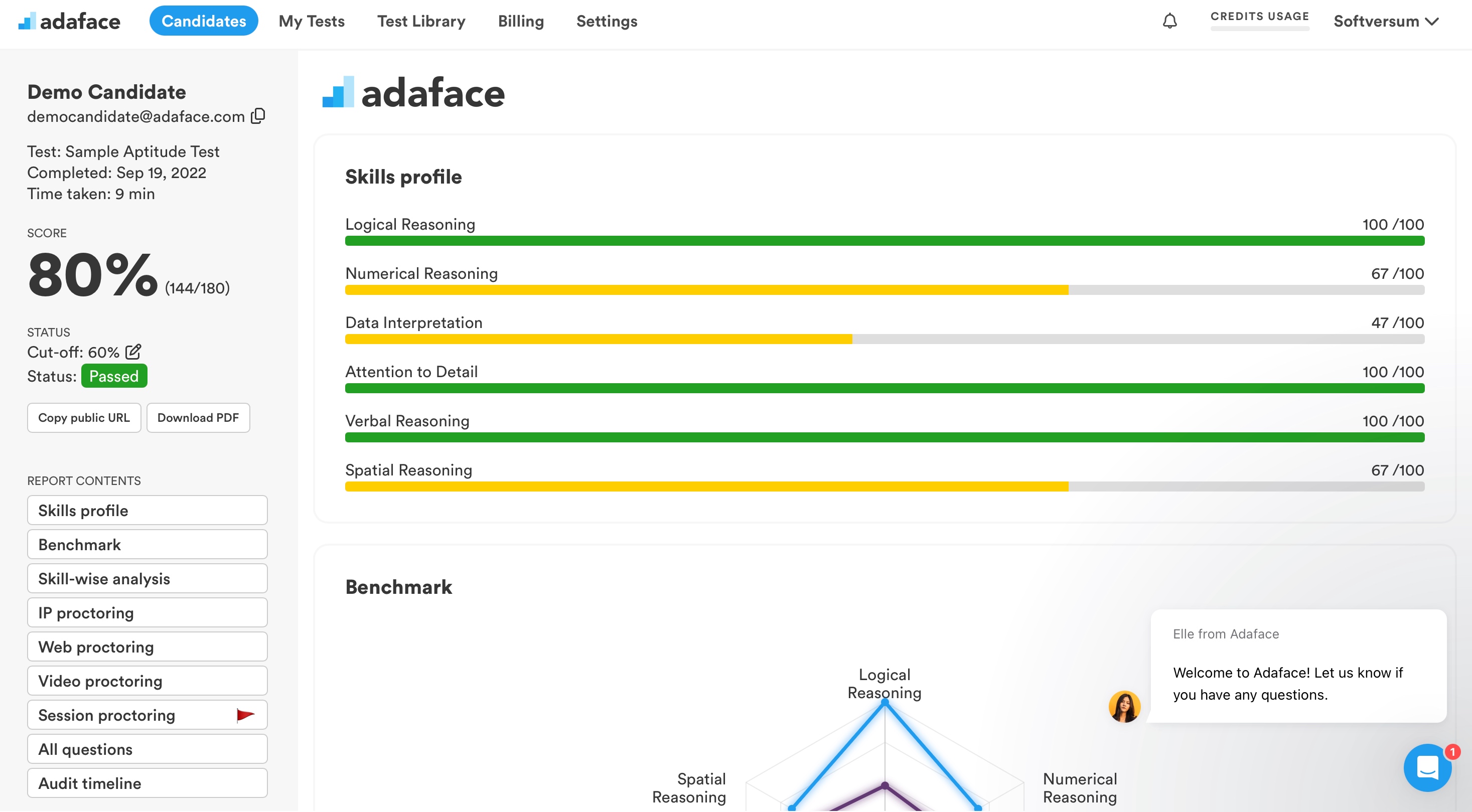
Plus, there are bar graphs and radar charts to help you actually see their strengths and weaknesses. Honestly, it's way more granular than what any resume can ever tell you – a real "Aha!" moment for me.
Of course, Adaface understands that test integrity is key. That’s why they’ve included a range of proctoring tools. You get things like:
- IP address tracking
- Web tab switch logs
- Session screenshots
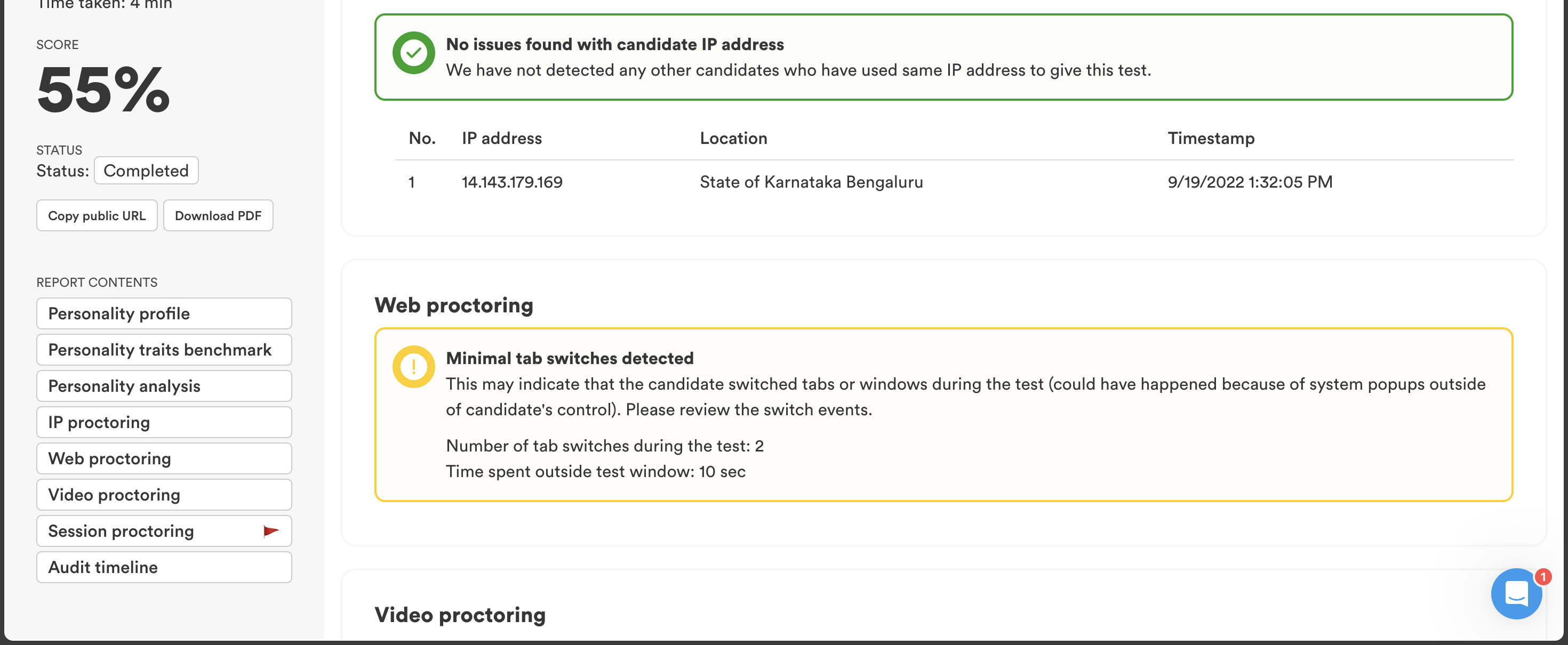
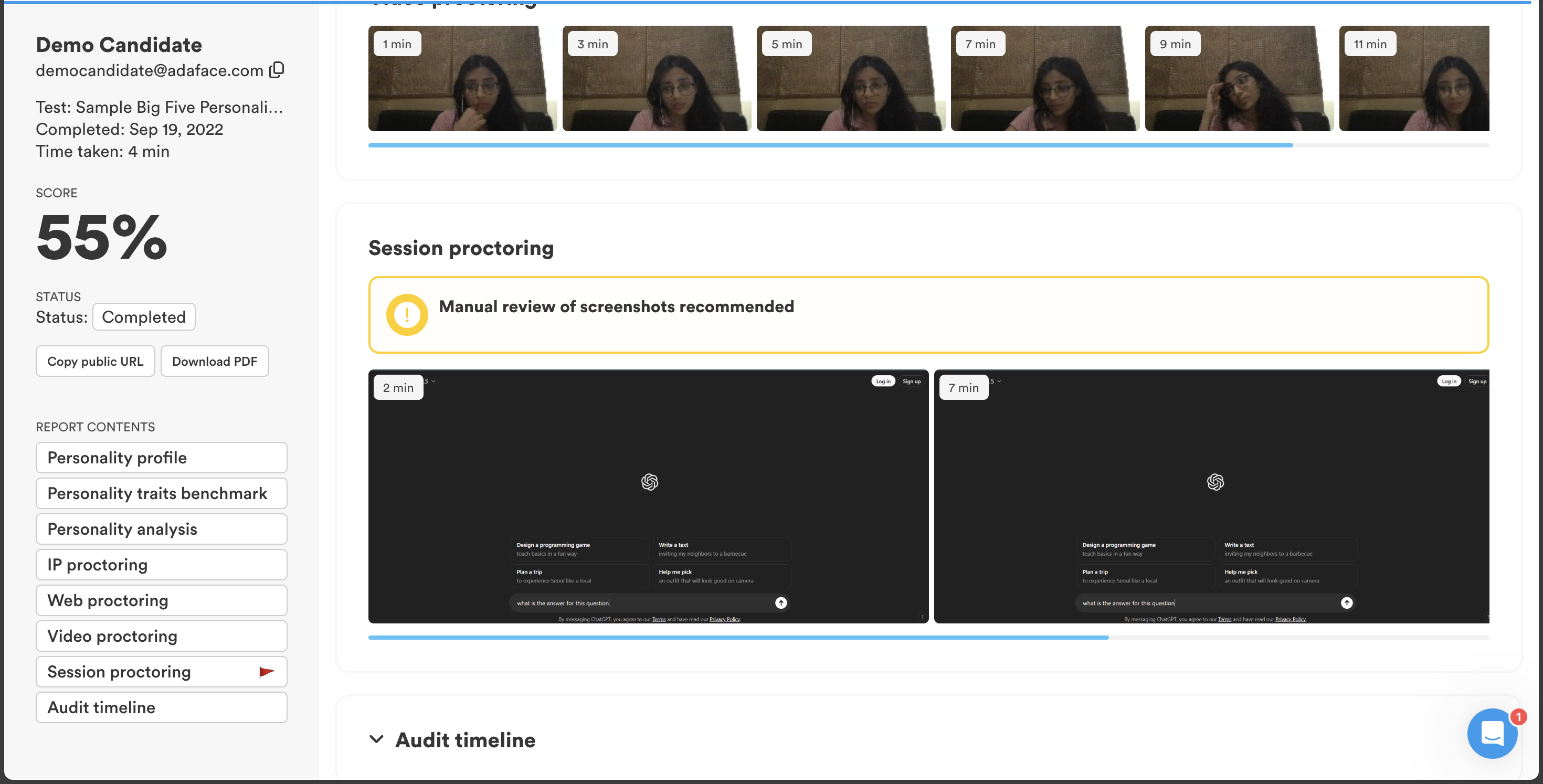
Now, while these measures ensure a fair playing field and help you verify that you're actually assessing the candidate's own abilities – like having a digital referee watching the game – it's also worth noting that this level of proctoring might feel a little intense for some candidates. It’s a bit of a trade-off – the platform prioritizes test integrity, but that could potentially be off-putting to some. This is something to keep in mind if you're considering using the full suite of proctoring features.
The user experience is smooth throughout, with an intuitive interface that’s easy to navigate. It's clear that the platform was built for everyone, not just techies. And what I particularly appreciate is that it’s not just tech assessments they are focused on. There are also aptitude, personality, and other types of assessments, making it a more comprehensive solution for skills-based hiring. It really is about assessing a candidate's actual capabilities.
Overall, my time exploring Adaface has left me with a really positive impression. It feels like a well-thought-out, powerful, and user-friendly platform that goes beyond traditional hiring methods. It's not just a resume screener; it's a true assessment tool.
Practical Applications (Use Cases and Benefits)
Alright, so we know Adaface is like a skills-based pizza-tasting booth for job candidates. But where does it actually shine in the real world? Let's talk about the practical applications and the juicy benefits.
First up, let’s talk about tech roles. If you're hiring developers, software engineers, or anyone in the tech space, Adaface is a game-changer. Instead of relying on resumes packed with buzzwords, you can actually see if they can code, problem-solve, and handle real-world scenarios. Think of it as a simulator for engineers, where they prove their skills instead of just stating them. It can be used to assess skills in:
- Frontend Development: See if they can create responsive and user-friendly interfaces.
- Backend Development: Evaluate their ability to build robust and scalable server-side applications.
- Data Science and AI: Assess their proficiency in data analysis, machine learning, and other AI-related skills.
But Adaface isn't just for tech roles. It's a versatile tool that can be used across various departments. Think of it like a Swiss army knife for hiring, that can be used for both technical and non-technical roles.
For Business Roles:
- Marketing: Assess skills in digital marketing, content creation, and data analytics.
- Sales: Evaluate sales skills, communication, and customer relationship management.
- Finance: Test skills in accounting, financial analysis, and budgeting.
- Project Management: Evaluate planning, organization, and leadership abilities.
Essentially, if there’s a skill you need to test, Adaface can probably handle it.
Now, let’s move to the benefits - and believe me, there are plenty!
For the Business Owner/Hiring Manager:
- Time Saver: Imagine not spending weeks sifting through resumes, interviewing the wrong people, and having Steve (the plant) do a better job at picking the candidates. Adaface streamlines the hiring process and helps you filter out candidates who don't have the skills.
- Quality of Hires: By focusing on skills, you’re way more likely to hire someone who can actually perform the job well, which can lead to better productivity, innovation, and growth. It is no longer a game of resume roulette.
- Reduced Cost: By reducing bad hires, you can cut down on wasted resources, training, and the costs associated with employee turnover.
For HR Teams:
- Objective Hiring: Adaface helps remove bias by focusing on skills rather than subjective criteria. It helps you make decisions based on data, not gut feelings.
- Detailed Scorecards: The platform provides in-depth scorecards with benchmarks, helping you compare candidates objectively.
- Reduced Time-to-Hire: This saves time on the hiring process.
For the Candidates:
- Fairer Chance: Adaface gives candidates a fairer chance to showcase their actual abilities, regardless of their resumes or interview skills.
- Better Experience: The conversational testing approach is way less intimidating and more engaging than traditional assessments. It’s like having a friendly chat rather than a stressful interrogation.
In essence, Adaface isn’t just about finding any employee. It’s about finding the right employee, streamlining your hiring process, and setting your team up for success. It's like a superpower that helps you hire top-notch talent. It really does cut the guesswork.
Key Features (Technical but Accessible)
Alright, we’ve talked about what Adaface does, now let’s peek under the hood and check out how it does it. Don't worry, we’re not going to get lost in a maze of code or tech jargon. Think of it like looking at the controls of a fancy car; you don't need to be an engineer to appreciate the cool features.
First up, let's talk about the different Test Categories. Adaface isn't a one-trick pony. They offer a wide range of tests designed to evaluate different skill sets. You've got:
- Coding Tests: These assess programming abilities in multiple languages and frameworks – think of it like a practical coding challenge where they have to write code that actually works. They are not just solving theoretical puzzles.
- Aptitude Tests: These measure cognitive abilities like logical reasoning, numerical ability, and problem-solving – basically, seeing how well their brain works, like an IQ test but less stressful (and more useful!).
- Business Skills Tests: This covers everything from data analysis to project management, and so on. – It's like a performance assessment for people who deal with real-world business scenarios.
- Personality Tests: These assess personality traits to see if a candidate is a good culture fit for your team – like a personality quiz that's actually scientifically backed and useful (unlike that one you took on Facebook)....and many more!
Each test category has multiple tests that are designed to be aligned with actual job requirements.
Now, let's talk about the Conversational Approach. Remember Ada, the friendly chatbot? Well, this is a key part of how Adaface works. Instead of a dry, intimidating test, candidates are guided by Ada through a friendly and engaging conversation. It’s like having a patient and supportive test proctor who makes the whole process feel way less stressful. It’s designed to be less like taking a test and more like having a conversation about a topic, and this makes the experience more engaging and a lot less intimidating.
Then there's the Proctoring Features, and as mentioned earlier, they're robust. These features are designed to maintain the integrity of the tests and ensure no one is trying to pull any sneaky moves. They include things like:
- Webcam Proctoring: A virtual eye that ensures candidates stay focused.
- Screen Proctoring: Captures what's happening on the candidate's screen, like having a security camera for the test.
- IP Proctoring: Tracks the location of candidates to prevent multiple attempts from the same spot.
These features are there to ensure fairness for everyone and helps you get a clear idea of the candidates skills. It’s like having a high-tech security system for your hiring process.
Strengths, Limitations, and Pricing
Alright, so we've explored what Adaface is and how it works, and we've seen all of its fancy bells and whistles. But, like any tool, it’s not perfect. Let's get real and talk about the good, the not-so-good, and the cost.
First, let's start with the Strengths, because, let's be honest, there are many:
- Focus on Practical Skills: This is the biggest win, really. Adaface doesn't care about your theoretical knowledge; it focuses on your actual skills, what you can actually do. It's like judging a chef on their cooking, not just their culinary school diploma.
- Saves Time: By skipping the resume black hole and filtering out the unqualified candidates, Adaface seriously reduces the time you spend on the hiring process. It's like having a cheat code for your hiring process, saving you tons of time.
- Objective Assessment: Adaface helps you make hiring decisions based on data and skills rather than gut feelings or personal biases. This results in a much fairer process for candidates and more reliable hires for you.
- Better Candidate Experience: The conversational tests, the friendly chatbot, and the focus on actual skills all contribute to a better, more engaging, and less stressful experience for candidates. They feel like they're being fairly assessed, and that counts for a lot.
- Robust Proctoring Features: The advanced proctoring tools are impressive and provide a high level of test integrity. This is especially important when you're assessing a large number of candidates.
Okay, now for the Limitations. Because no tool is perfect:
- Not a One-Size-Fits-All Solution: While versatile, Adaface might not be the best fit for every single role. For some roles, a traditional interview or other type of assessment might still be necessary.
- Customization Requires Effort: While the platform allows for customization, it does take some time and effort to tailor tests perfectly to your specific needs. It's not just plug-and-play; some setup is required.
- Proctoring Intensity: As mentioned earlier, the proctoring features, while effective, might feel a bit too intense for some candidates, potentially impacting their comfort level during the test. It's something to keep in mind and adjust depending on your target audience.
Finally, let’s talk about Pricing. Adaface uses a credit-based system, which can seem a bit confusing at first, but it's actually pretty straightforward once you get the hang of it. Think of it like buying tokens at an arcade – you get a set number to use, and each game (or in this case, test invite) costs a certain number of tokens.
Here’s the breakdown:
- Credit-Based System: You buy credits, and each action costs a certain number of credits.
- Test Costs:
- Ready-to-use test: 5 credits
- Custom test: 10 credits
- Candidate Invite : 1 credit ( if a candidate does not take the test, that credit is added back)
- Example: Let's say you create one custom test (that's 10 credits), and you invite 90 candidates (that's 90 credits). In total, you would use 100 credits in this scenario.
- Different Plans: Adaface offers several plans tailored to different needs, and here’s how they stack up (think of them as different sized pizzas, like we did earlier):
- Individual Plan: $180/year, 12 credits/year
- Starter Plan: $500/year, 50 credits/year
- Pro Plan: $900/year, 100 credits/year
- Scale Plan: $3000/year, 500 credits/year
- Growth Plan: $5500/year, 1000 credits/year
- Enterprise Plan: $20,000/year, 5000 credits/year
- Unlimited Plan: $50,000/year (for staffing use cases)
Now, let's be real, the pricing here can be considered expensive, especially if you're a small business or just starting out. These plans are definitely an investment, and it may feel like a big sum. It is important to analyze your business needs and see if this is the right tool for you.
However, it’s crucial to consider the cost of not using a tool like Adaface. Bad hires can be very expensive, leading to wasted resources, time, and training. So, while the price tag may seem high upfront, the value of Adaface is in its potential to mitigate those long-term costs. It's like paying for a high-quality tool that can save you a lot of trouble down the line. In short, the prices are competitive but it can be expensive and it really depends on your company needs.
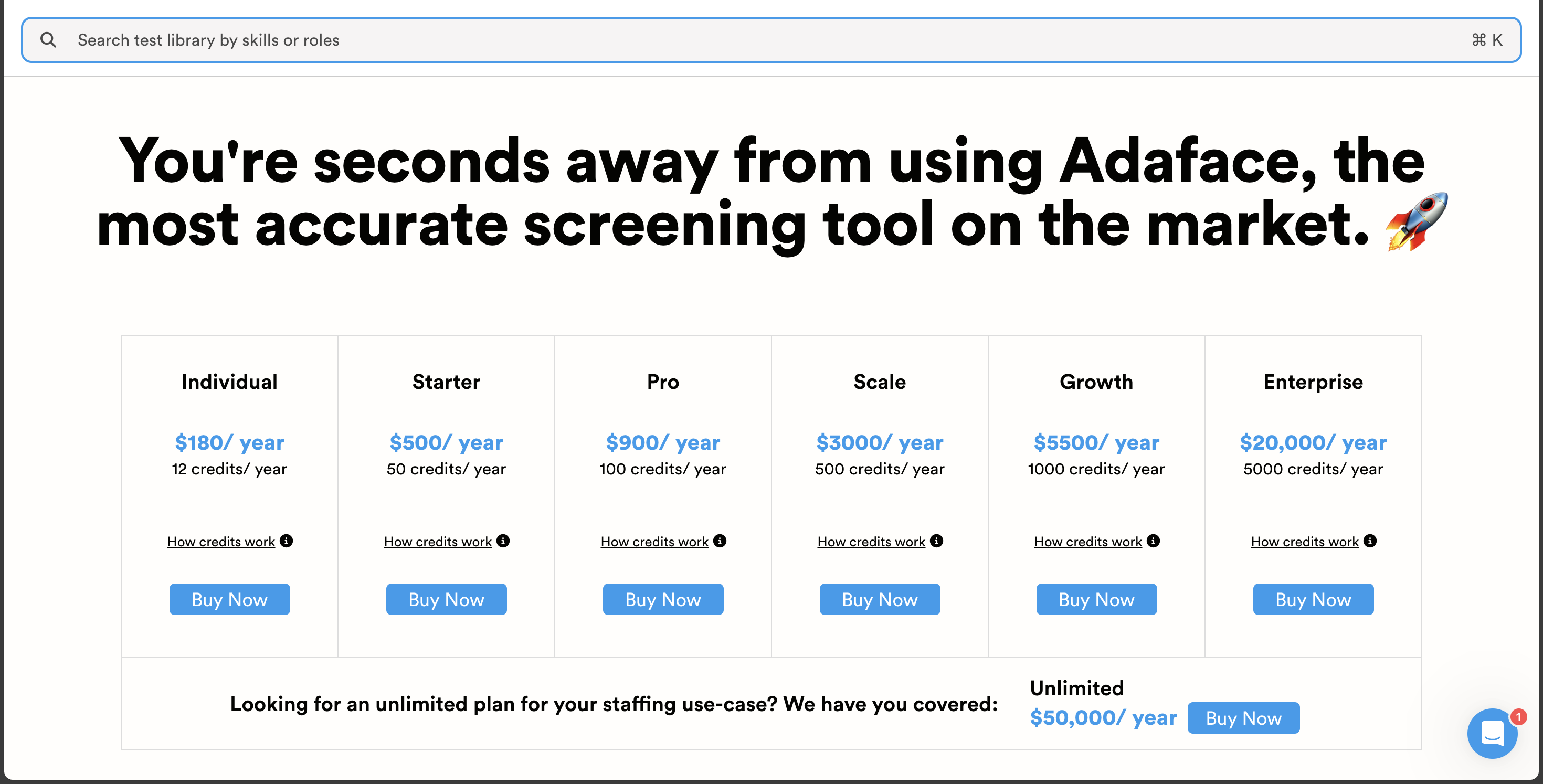
Privacy & Terms of Service (Short and Sweet)
Alright, before we wrap things up, let's talk about the not-so-exciting, but super important topic of privacy and terms of service. I know, I know, it’s like reading the instruction manual for a microwave – necessary, but not exactly thrilling. However, it is important to know that Adaface takes privacy seriously and transparent with how they handle your data.
Let's cut to the chase: Adaface is committed to protecting your data and the data of your candidates. They are GDPR compliant (if you are in Europe) and EEOC compliant which means they follow all the necessary rules and regulations, and adhere to ethical practices when collecting your data and your candidate's data. Think of them as the responsible data guardians. They’ve got your back.
Here are the key takeaways:
- Data Security: They use industry-standard security measures to keep your data safe. It's like having a high-tech security system for your information.
- Candidate Privacy: They treat your candidate's data with the utmost respect and do not share it without your consent, as per the GDPR and other privacy regulations.
- Transparency: You can find all of the nitty-gritty details in their Terms of Service and Privacy Policy documents on their website. They don't hide anything in fine print. They are very transparent.
- Terms and Services: This is where you'll find the details about how they use your data and your rights.
- Privacy Policy: This section details what information they collect and how they safeguard this information.
- Trust Guide: Adaface also has a "Trust Guide" section on its website that explains the measures they take to protect your data.
Basically, Adaface is really big on making sure your data (and your candidates’ data) is safe and sound. They don't mess around when it comes to protecting sensitive information. They are very transparent and have made all the needed information readily available.
So, if you're the legal type who loves reading the fine print, you can definitely find all the details on their website. But for the rest of us, the main message is that they take data privacy seriously, adhere to all the relevant regulations and are very transparent about their practices. And that is really all you need to know.
Is it Worth It?
Alright, folks, we’ve reached the end of our Adaface adventure. We’ve explored what it is, how it works, its cool features, and, let’s not forget, the very expensive elephant in the room - the price tag. It's time to ask the big question: Is Adaface really worth it?
Let's recap: Adaface is a powerful online assessment platform that's all about skills, not just resumes. It provides an easier and more streamlined way to hire qualified candidates. It uses a conversational interface, practical test, and proctoring features and it provides a lot of valuable data and insights.
However, as we've also discussed, it's definitely not the cheapest option. The pricing can feel hefty, and for some businesses, especially those with tight budgets or those hiring for lower-paying roles, the cost may simply be too high. We must be realistic about this; if you have 1000s of applicants, paying such a high price for Adaface does not make sense, and it might not be the best solution.
In this scenario, where hiring volume is high and the pay is low, paying such a high amount for a tool like Adaface may not be the right investment for you. It's like choosing between that cheap pizza down the street (the usual hiring methods) and a gourmet, top-shelf, organic pizza (Adaface) – one is cheap, and one is more expensive but worth it if your context is different.
So, here’s the honest truth: If you're operating on a super tight budget, and hiring for low salary roles, Adaface might feel like a splurge that's not worth it. If that’s you, maybe you need to reconsider your current hiring needs and if this is what you need at this current moment. In this case, the cost of bad hires (if any) will most likely be less than the cost of Adaface.
Let’s look at the other side of the coin. For other types of businesses, particularly those hiring for roles with a higher salary, and a higher need for a specialized skill, or are simply looking to scale up and hire a highly qualified candidate; the story will be different. The cost of bad hires – the wasted time, the lost productivity, the cost of retraining and replacement - can be way more expensive than the cost of Adaface. Adaface saves you time, helps you make objective hiring decisions, reduces bias, and most importantly helps you hire people who are actually good at the job rather than what their resume states. It's an elimination tool to streamline your hiring process and prevent you from hiring the wrong people. It provides a more efficient and streamlined hiring process, and in the long run, it can actually save you money and time. And, it can definitely help you find people that can take your business to new heights.
Ultimately, whether Adaface is "worth it" depends heavily on your specific needs, budget, and the roles you're hiring for. If you value time-saving, objective hiring, reducing bias, a better candidate experience, and hiring based on real skills AND you're hiring for roles with an adequate budget, then it's definitely a tool to consider. But if you're working with a tight budget and hiring for low salary roles where the cost of bad hires isn't a huge concern, then it might not be the best fit.
To put it simply: If you're tired of hiring based on guesswork, have the budget to support it, and want to find the right people based on what they can actually do, Adaface is definitely worth checking out. However, if your budget is tight and you're hiring for lower-paying roles with large applicant pools, then it may be an unnecessary expense. It’s a powerful tool, but like any tool, you should make sure that it is the right fit for you. It’s like a premium tool that can be a game changer, but only if it makes sense for your budget and needs.

